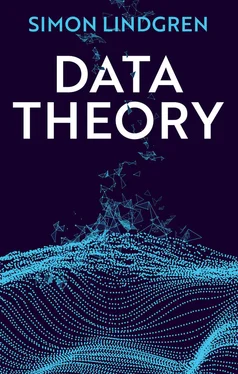1 Title page Data Theory Interpretive Sociology and Computational Methods Simon Lindgren polity
2 Copyright page Copyright page Copyright © Simon Lindgren 2020 The right of Simon Lindgren to be identified as Author of this Work has been asserted in accordance with the UK Copyright, Designs and Patents Act 1988. First published in 2020 by Polity Press Polity Press 65 Bridge Street Cambridge CB2 1UR, UK Polity Press 101 Station Landing Suite 300 Medford, MA 02155, USA All rights reserved. Except for the quotation of short passages for the purpose of criticism and review, no part of this publication may be reproduced, stored in a retrieval system or transmitted, in any form or by any means, electronic, mechanical, photocopying, recording or otherwise, without the prior permission of the publisher. ISBN-13: 978-1-5095-3927-7 (hardback) ISBN-13: 978-1-5095-3928-4 (paperback) A catalogue record for this book is available from the British Library. Typeset in 10.5 on 12pt Sabon by Fakenham Prepress Solutions, Fakenham, Norfolk NR21 8NL Printed and bound in Great Britain by TJ International The publisher has used its best endeavours to ensure that the URLs for external websites referred to in this book are correct and active at the time of going to press. However, the publisher has no responsibility for the websites and can make no guarantee that a site will remain live or that the content is or will remain appropriate. Every effort has been made to trace all copyright holders, but if any have been overlooked the publisher will be pleased to include any necessary credits in any subsequent reprint or edition. For further information on Polity, visit our website: politybooks.com
3 Introduction: Data/Theory Outline of this book
4 1 Beyond Method Datafication Data theory Verstehen and Evidenz Theories old and new A bit of anarchy Data piñata Breaking things to move forward A patchwork of solutions The interpretive interface Instruments of revelation
5 2 Decoding Social Forms The odd places of politics Social media politics for better or for worse Virality and memes The Weber connection: Ambivalence and trolling as ideal types The Durkheim connection: Society > the sum of its parts The Simmel connection: Social forms Social cryptography
6 3 Unintended Consequences The thumb-typing leader of the free world Unpacking ambivalence Error L’affaire covfefe Social media backfire
7 4 Actor-Networks A sociology of translation Finding the actors Making connections Who owns theory?
8 5 Collective Representations Words and the company they keep Learning from afar Reading Reddit Mapping the language of Reddit Nodes and chains
9 6 Symbolic Power Social fields Capital and habitus Adapting Bourdieu’s capital forms to social media data A social space of political tweets
10 7 Theoretical I/O Gaining theoretical sensitivity Data science as ethnography
11 Conclusion: Theory/Data Brutalising theory Notes on ethics Final remarks
12 References
13 Index
14 End User License Agreement
1 Cover
2 Contents
3 1 Beyond Method
1 iii
2 iv
3 1
4 2
5 3
6 4
7 5
8 6
9 7
10 8
11 9
12 10
13 11
14 12
15 13
16 14
17 15
18 16
19 17
20 18
21 19
22 20
23 21
24 22
25 23
26 24
27 25
28 26
29 27
30 28
31 29
32 30
33 31
34 32
35 33
36 34
37 35
38 36
39 37
40 38
41 39
42 40
43 41
44 42
45 43
46 44
47 45
48 46
49 47
50 48
51 49
52 50
53 51
54 52
55 53
56 54
57 55
58 56
59 57
60 58
61 59
62 60
63 61
64 62
65 63
66 64
67 65
68 66
69 67
70 68
71 69
72 70
73 71
74 72
75 73
76 74
77 75
78 76
79 77
80 78
81 79
82 80
83 81
84 82
85 83
86 84
87 85
88 86
89 87
90 88
91 89
92 90
93 91
94 92
95 93
96 94
97 95
98 96
99 97
100 98
101 99
102 100
103 101
104 102
105 103
106 104
107 105
108 106
109 107
110 108
111 109
112 110
113 111
114 112
115 113
116 114
117 115
118 116
119 117
120 118
121 119
122 120
123 121
124 122
125 123
126 124
127 125
128 126
129 127
130 128
131 129
132 130
133 131
134 132
135 133
136 134
137 135
138 136
139 137
140 138
141 139
142 140
143 141
144 142
145 143
146 144
147 145
148 146
149 147
150 148
151 149
152 150
153 151
154 152
155 153
156 154
157 155
158 156
159 157
160 158
161 159
162 160
163 161
164 162
165 163
166 164
167 165
168 166
169 167
170 168
171 169
172 170
173 171
174 172
175 173
176 174
177 175
178 176
179 177
180 178
181 179
182 180
183 181
184 182
185 183
186 184
187 185
188 186
189 187
190 188
191 189
192 190
193 191
194 192
195 193
196 194
197 195
198 196
199 197
200 198
Data Theory
Interpretive Sociology and Computational Methods
Simon Lindgren
polity
Copyright © Simon Lindgren 2020
The right of Simon Lindgren to be identified as Author of this Work has been asserted in accordance with the UK Copyright, Designs and Patents Act 1988.
First published in 2020 by Polity Press
Polity Press
65 Bridge Street
Cambridge CB2 1UR, UK
Polity Press
101 Station Landing
Suite 300
Medford, MA 02155, USA
All rights reserved. Except for the quotation of short passages for the purpose of criticism and review, no part of this publication may be reproduced, stored in a retrieval system or transmitted, in any form or by any means, electronic, mechanical, photocopying, recording or otherwise, without the prior permission of the publisher.
ISBN-13: 978-1-5095-3927-7 (hardback)
ISBN-13: 978-1-5095-3928-4 (paperback)
A catalogue record for this book is available from the British Library.
Typeset in 10.5 on 12pt Sabon
by Fakenham Prepress Solutions, Fakenham, Norfolk NR21 8NL
Printed and bound in Great Britain by TJ International
The publisher has used its best endeavours to ensure that the URLs for external websites referred to in this book are correct and active at the time of going to press. However, the publisher has no responsibility for the websites and can make no guarantee that a site will remain live or that the content is or will remain appropriate.
Every effort has been made to trace all copyright holders, but if any have been overlooked the publisher will be pleased to include any necessary credits in any subsequent reprint or edition.
For further information on Polity, visit our website: politybooks.com
Introduction: Data/Theory
This book is a tentative and modest proposal on how to think and operate as a theoretically sensitive social scientist in the age of datafication, especially when researching sociality and politics through the internet. The book emphasises the need to think freely and openly about both theory and method, and goes beyond some of the ways of doing social research that are dominant today. It does so by playfully and tentatively combining elements of theories and methods, some of which are commonly seen as being incompatible.
Читать дальше












